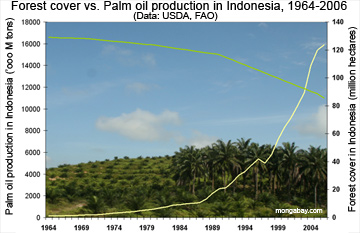Environmentalists and palm oil producers should work together
Environmentalists and palm oil producers should work together
Rhett A. Butler, mongabay.com
September 25, 2007
This editorial was pubished in the Jakarta Post on September 25, 2007 It was titled “How green is palm oil?”.
|
|
Environmentalists and palm-oil producers are increasingly at odds. Greens groups say palm oil is driving the conversion of tens of thousands of hectares of peatlands and lowland forest in Indonesia, putting wildlife at risk, increasing the vulnerability of forests to fires, and triggering large emissions of greenhouse gases.
Palm-oil producers say their industry plays a crucial role in Indonesia’s economic growth and provides employment to tens of thousands of Indonesians. Going further, some plantation owners suggest that campaigners are merely trying to hurt the industry, while others accuse the West of hypocrisy for criticizing palm-oil production while overlooking environmental harm caused by biofuels in other parts of the world, including the Amazon (soy biodiesel and sugar-cane ethanol), Europe (rapeseed), and the United States (corn ethanol).
 Forest cover versus palm oil production in Indonesia. |
Nevertheless, pressure from environmentalists is beginning to weigh on the industry, with European policymakers now reconsidering Indonesian palm oil as a source for biodiesel.
Now a new paper calls for a truce, proposing that conservationists work with palm-oil producers to protect particularly important areas of biodiversity. Writing in the scientific journal Nature, Lian Pin Koh and David S. Wilcove from Princeton University, argue that the high yield and high prices that make palm oil so attractive “could be turned to a biodiversity advantage.”
They suggest that green groups could buy small tracts of existing oil-palm plantations and use the revenue they generate to acquire land to establish a network of privately-owned nature reserves for biodiversity conservation.
Koh and Wilcove analyzed the profitability of oil-palm plantations in Sabah, Malaysia, and found that at current prices, each hectare of oil palm could provide funds to acquire 0.36 ha of land for conservation annually. Assuming oil-palm plantations break even after five or six years, this suggests that over the 25-year lifetime of an oil-palm plantation, a conservation group could generate enough cash to conserve seven hectares of forest for each hectare of oil palm.
|
|
Should carbon credits for avoided deforestation eventually be factored into the scheme, the area conserved could be even greater. In fact, the concept could be a way to cover the initial costs of starting up and certifying a carbon-offset project.
While some producers and environmental groups may think the proposal sounds crazy, Koh and Wilcove believe collaboration between the adversaries would be a “win-win partnership,” because NGOs would be able to protect forests while palm-oil companies “would be able to enhance their corporate image to satisfy environmentally-conscious consumers.”
Koh and Wilcove suggest that the relationship could lead both to innovation that reduces the environmental impact of oil-palm plantations and to the emergence of a premium market for sustainably produced palm oil which would provide financial incentives for palm-oil producers to adopt sustainable practices.
While it is possible that a premium market for eco-friendly palm oil could emerge on its own, the West could speed the process by offering producers a guaranteed market for palm biodiesel that is independently certified as having been produced in an environmentally sound and socially equitable way.
Instead of subsidizing grossly inefficient biofuel production at home, Europe and the United States could help drive the development of “greener” biofuels as well as the rehabilitation and conservation of forest lands.
Indonesians as well as the global environment would benefit from closer collaboration rather than escalation of conflict.
The writer is a U.S.-based entrepreneur with a background in economics.
Related articles
Indonesia’s peatlands may offer U.S. firms global warming offsets
(8/29/2007) The following is modified version of a letter I’ve used to pitch U.S. companies on the concept of carbon finance in Indonesia’s peatlands. Discussions are slow and the critical December U.N. climate meeting is fast approaching, so I’m posting this as a tool to help you get American firms interested in avoided deforestation offsets. Please feel free to use, modify, and distribute this letter widely.
Could peatlands conservation be more profitable than palm oil?
(8/22/2007) This past June, World Bank published a report warning that climate change presents serious risks to Indonesia, including the possibility of losing 2,000 islands as sea levels rise. While this scenario is dire, proposed mechanisms for addressing climate change, notably carbon credits through avoided deforestation, offer a unique opportunity for Indonesia to strengthen its economy while demonstrating worldwide innovative political and environmental leadership. In a July 29th editorial we argued that in some cases, preserving ecosystems for carbon credits could be more valuable than conversion for oil palm plantations, providing higher tax revenue for the Indonesian treasury while at the same time offering attractive economic returns for investors.
Dutch plan restricts biofuels that damage environment
(4/29/2007) The Netherlands has proposed a system to reduce the environmental impact of biofuels production. The country becomes the first in the world to establish such guidelines. Environmentalists have expressed increasing concern for the establishment of energy crops in biodiverse and carbon-rich ecosystems like the peatlands of Indonesia and the Amazon rainforest. They say that conversion of these forests for oil palm and soybeans is threatening endangered species and worsening global warming. Further, they warn, demand for such biomass energy products is driving up prices for food crops.
Palm oil doesn’t have to be bad for the environment
(4/4/2007) As traditionally practiced in southeast Asia, oil palm cultivation is responsible for widespread deforestation that reduces biodiversity, degrades important ecological services, worsens climate change, and traps workers in inequitable conditions sometimes analogous to slavery. This doesn’t have to be the case. Following examples set forth by the Roundtable on Sustainable Palm Oil and firms like Golden Hope Plantations Berhad, a Malaysian palm oil producer, oil palm can be cultivated in a manner that helps mitigate climate change, preserves biodiversity, and brings economic opportunities to desperately poor rural populations.
Eco-friendly palm oil could help alleviate poverty in Indonesia
(4/3/2007) The Associated Press (AP) recently quoted Marcel Silvius, a climate expert at Wetlands International in the Netherlands, as saying palm oil is a failure as a biofuel. This would be a misleading statement and one that doesn’t help efforts to devise a workable solution to the multiplicity of issues surrounding the use of palm oil.
